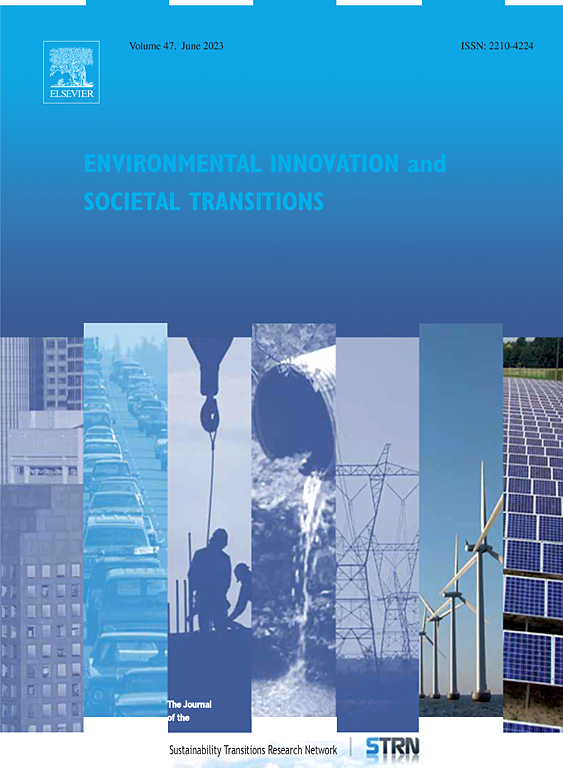Exploring sufficiency in meat diets: are consumers ready for consumption corridors?
IF 5.7
2区 经济学
Q1 ENVIRONMENTAL SCIENCES
Environmental Innovation and Societal Transitions
Pub Date : 2025-07-12
DOI:10.1016/j.eist.2025.101026
引用次数: 0
Abstract
This study highlights sufficiency principles and utilizes the consumption corridors (CC) framework to examine meat consumption. Conducted through a scenario-based experimental study with 901 participants representative of the Italian population, the research aimed to: explore perceptions of the CC concept, evaluate acceptance of a meat consumption reduction policy within CC standards, and identify factors influencing policy support. Findings showed moderate acceptance of the CC concept. The proposed policy received notable support (64 % of respondents), particularly for immediate implementation. Favourable individuals were predominantly altruistic, women, aged 55–70, with low meat consumption frequency and minimal association of meat with essential needs satisfaction. The study underscores the utility of the CC framework for designing and evaluating policies focused on reducing consumption. It offers valuable guidance for researchers and policymakers addressing Anthropocene challenges by fostering transitions toward sustainable consumption practices.
探索肉类饮食的充足性:消费者准备好消费走廊了吗?
本研究强调充足性原则,并利用消费走廊(CC)框架来检查肉类消费。通过一项基于场景的实验研究,901名代表意大利人口的参与者参与了这项研究,该研究旨在:探索对CC概念的看法,评估在CC标准下肉类消费减少政策的接受程度,并确定影响政策支持的因素。研究结果显示对CC概念的接受程度中等。建议的政策得到了显著的支持(64%的受访者),特别是立即实施。有利的个体主要是利他主义的女性,年龄在55-70岁之间,肉类消费频率低,肉类与基本需求满足的联系最小。该研究强调了CC框架在设计和评估以减少消费为重点的政策方面的效用。它为研究人员和政策制定者提供了宝贵的指导,通过促进向可持续消费实践的过渡来应对人类世的挑战。
本文章由计算机程序翻译,如有差异,请以英文原文为准。
求助全文
约1分钟内获得全文
求助全文
来源期刊

Environmental Innovation and Societal Transitions
Energy-Renewable Energy, Sustainability and the Environment
CiteScore
13.60
自引率
19.40%
发文量
90
审稿时长
56 days
期刊介绍:
Environmental Innovation and Societal Transitions serves as a platform for reporting studies on innovations and socio-economic transitions aimed at fostering an environmentally sustainable economy, thereby addressing structural resource scarcity and environmental challenges, particularly those associated with fossil energy use and climate change. The journal focuses on various forms of innovation, including technological, organizational, economic, institutional, and political, as well as economy-wide and sectoral changes in areas such as energy, transport, agriculture, and water management. It endeavors to tackle complex questions concerning social, economic, behavioral-psychological, and political barriers and opportunities, along with their intricate interactions. With a multidisciplinary approach and methodological openness, the journal welcomes contributions from a wide array of disciplines within the social, environmental, and innovation sciences.
 求助内容:
求助内容: 应助结果提醒方式:
应助结果提醒方式:


